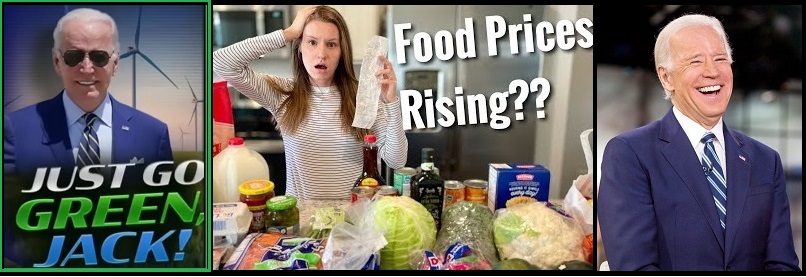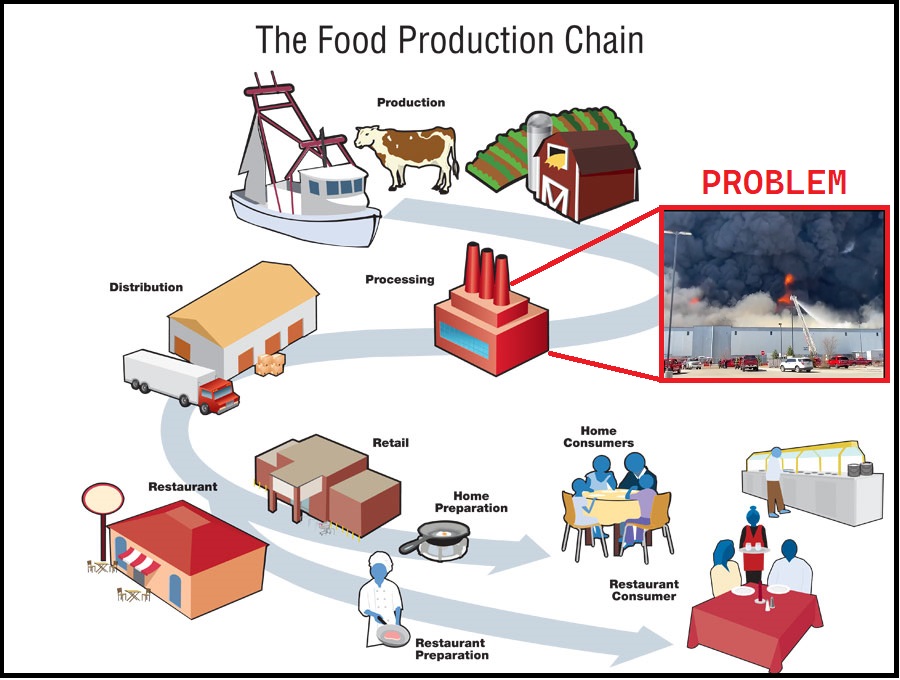Biden Solution to High Retail Food Prices, Eat Generics and Store Brands

CTH has covered the origin of food inflation since we first raised the alarms in the spring of 2020. A confluence of events starting with the fracturing of the food supply chain (shutting down restaurants, hospitality venues, schools, cafeterias, etc), created the initial major problem. Consumer Packaged Goods (CPG) sold at retail stores could not keep up with demand after 50% of the food supply system was shut down.
 Within the U.S. retail food supply chain (350+ million people), manufacturing CPG products relies on a system of staying one to two harvest cycles ahead of demand. However, when restaurants and fresh food venues were closed, very quickly frozen, bulk stored and siloed U.S. food storage systems, the storage needed for CPG products, were emptied.
Within the U.S. retail food supply chain (350+ million people), manufacturing CPG products relies on a system of staying one to two harvest cycles ahead of demand. However, when restaurants and fresh food venues were closed, very quickly frozen, bulk stored and siloed U.S. food storage systems, the storage needed for CPG products, were emptied.
Long after the time when all food distribution was reopened, the shortages of CPG products continued. You saw the result with empty shelves at the supermarket. It takes a long time (years) for those inventories to refill.
We warned of this in 2020 and then followed the predictable outcome in 2021 and 2022.
When Joe Biden then shut down the U.S. energy production system in early 2021, the massive increases in energy costs -and the shortages of natural gas- became fuel on the inflationary fire of CPG goods. Again, in October 2021 CTH noted that retail prices were going to rise quickly, and they did.
Throughout 2022 food prices have risen dramatically as the food distribution and processing system was now under pressure from all sides. The shortage of inputs (to refill food storage and warehousing needs) combined with the much higher costs to generate those inputs -the direct result of the exploding energy costs- created massive inflation pressure. The pricing result we are seeing now (third wave of food inflation) is exactly what we have stated, discussed and predicted for more than two years.
While all food costs are skyrocketing, the prices for manufactured or processed food are much higher than the price increases for fresh food.
While both fresh and CPG foods have risen in price due to energy costs, the processing of food uses more energy… and that energy comes at a higher price…. so the CPG inflation is much higher than the fresh half of the supply chain.
In essence, the CPG goods carry higher farming costs plus much higher manufacturing costs.
For those who say, ‘fresh food is healthier‘, you are correct. However, let me also remind you that we cannot feed 350 million people with fresh food alone – and simultaneously export billions of tons of bulk food products like grain, corn and soybeans.
The U.S. food distribution system needs processed food for retail restaurants, cafeteria, lunchrooms and grocery stores. [Ex. Italian restaurants will not start making pasta sauce from tomatoes, and if they did you likely couldn’t afford to eat there.]
So here comes Joe Biden, without a clue in the world of what I just described above. And his food inflation solution?…. well, you just have to hear it yourself to see it. WATCH (01:35, prompted):
[Wall Street Journal] – […] The personal saving rate, a measure of how much money people have left over after spending and taxes, fell to 3.1% from 3.4% in August. It is down from 7.9% a year ago as consumers tap their rainy-day funds.
U.S. credit-card balances hit $916 billion in September, returning to prepandemic levels, credit-reporting firm Equifax Inc. said. Balances are up 9% from January and about 23% higher than their pandemic low in April 2021.
A closely watched reading of underlying inflationary pressures, meanwhile, picked up last month and remained near a four-decade high. When stripped of volatile food and energy prices, the PCE price index strengthened to a 5.1% year-over-year increase—the strongest pace since March.
Friday’s report comes on the heels of other data showing consumers’ momentum weakened in the summer months. Consumer spending accounts for roughly two-thirds of total U.S. economic output. (read more)




Post a Comment